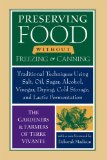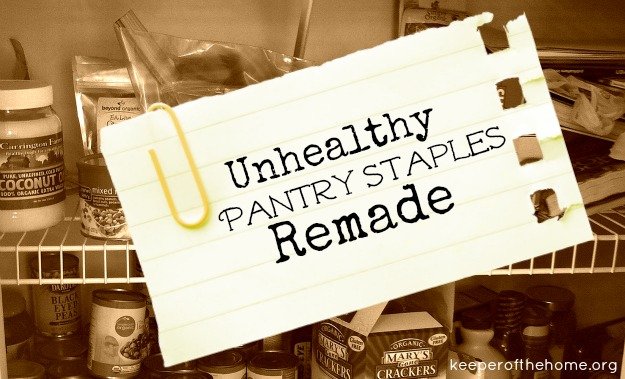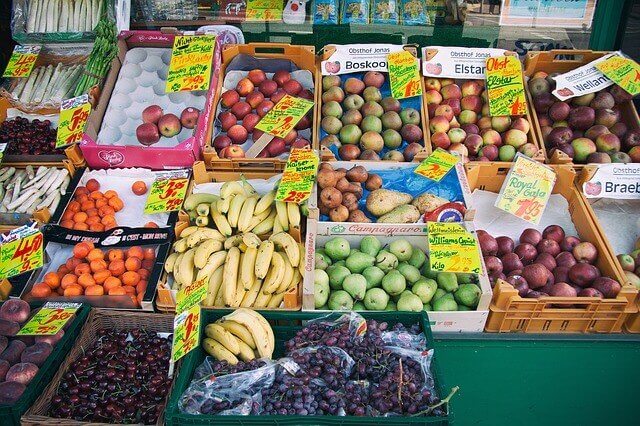Long-Term Storage for Lacto-fermented Veggies?
I've made my own lacto-fermented veggies and condiments and we enjoyed them in the fridge for up to a couple of months.
However, I am unsure of what I can do for long-term storage (since they generally need to be kept cool once the fermentation has taken place, so that they don't over-ferment, leading to soggy veggies, bad taste and possibly safety issues). I only have one fridge and cannot possibly store all of the pickles that I truly want to make this summer with my garden bounty (or anything else I decide to try, like lacto-fermented salsas, chutneys, etc.).
What's a nourishing foodie/frugal food preserver to do?!?
What other options have any of you tried for keeping these veggies when fridge room just wasn't available (and neither is a root cellar- a garage is the best I've got!)?
Along this topic, I am also planning to purchase a book on fermentation and food preserving, so that I have something even more in-depth than the chapter in Nourishing Traditions
(though that is a fantastic place to begin). Here are the two books I'm considering:
 Wild Fermentation: The Flavor, Nutrition, and Craft of Live-Culture Foods
Wild Fermentation: The Flavor, Nutrition, and Craft of Live-Culture Foods
OR
Any thoughts on either book?
I've heard many rave reviews of Wild Fermenation and it was originally my first choice, although from what I've heard it includes just a little bit too much information on the author's alternative lifestyle. The Preserving Food book also sounds great, though perhaps lacks some detail in it's discussion of preserving safety and in some of the recipes. Other book suggestions (so long as they have plenty of recipes for making use of my garden produce!) would be appreciated!






I purchased wild fermentation a couple of years back, unaware of the author’s ‘alternative lifestyle’. When my husband picked it up (before I even had a chance) he was so disgusted he threw it right in the trash. I have heard great things about it, but it wasn’t worth it.
The second book is great. I picked it up from the library about 6 months ago and still need to purchase it to have in our library.
Traditionally, I believe a root cellar would be the cold storage option outside of the refrigerator.
I have the Preserving Food book and have made several things in it. I like how they include info like “if your olives develop mold, you can scoop it off the top and the rest of the olives are still okay.” For a beginner like me, that is very helpful. It is pretty neat, but does rely quite a bit on cold storage. If you have cold storage issues at the moment, this one may not be the way to go if you can only get one.
I haven’t read the Wild Fermentation one yet, though, so I guess I can’t really make a true comparison. If you get the first book, I’d be interested to hear your review of it.
We got a free used second refrigerator…I prayed about getting one and a few months later we were blessed with one. We love NT tomato pepper relish and I make lots of half gallons of it. We also use the extra frig to store our garden produce, and the extra food we buy in bulk when we make the long trips to Whole Foods and a few farms and apple orchard. Tip: store apples in a completely sealed plastic bag…inside the bag will get all wet, but that’s fine…the apples keep perfectly for months. I just took the very last apple out of a sealed bag…it had been in there since the end of last summer.
According to The Encyclopedia of Country Living (10th Edition) on page 356-357, it says you can store fully fermented pickles for 4-6 months in the refrigerator provided you remove surface scum and molds regularly. It goes on to say…
“But canning is a better way to store fully fermented pickles. To can them, pour the brine into a pan, heat slowly to a boil, and simmer 5 minutes. Filter brine through clean cloth or paper coffee filters to reduce cloudiness, if desired. Fill pint or quart jars with pickles and hot brine. Leave 1/2 inch headspace. Put on lids. This is a raw pack. Process pints in boiling water bath 15 minutes at 1-6,000 feet above sea level, 20 minutes above 6,000 feet. Process quarts and extra 6 minutes.”
This would certainly work, but would you receive the same health benefit from a cooked product? (I’d have to look that up in my Nourishing Traditions.) I have no clue if this second idea of mine would work, but if you were to store the cucumbers in a root cellar or similar method, could you not make the fermented pickles later in the season – a little at a time as you needed them? I haven’t tried storing them long term, so I’m not sure this would work.
I liked the Wild Fermenting book, but I was put off by his “queer fairy folk” community. Ce la vive, I guess, but why did he have to even put that info in the book? It adds nothing to the content.
I’ve got the other one on hold at the library.
I’m thinking if you canned up fermented pickles, the heat processing would kill the good bacteria.
I live in SW Louisiana, so no cold storage here. I hadn’t even though about a second fridge.
Hi Stephanie, I also have the same question about storing my lacto-ferments! Just this saturday my dh and I ‘put up’ about 12 quarts sort of impulsively and now we need to refrigerate them!!! And, today was milk pick up, 8 gallons of raw yummy! So I am looking for answers too. I am praying the Lord provide an extra fridge, but with our large family we already have one extra large chest freeze, an upright large freezer, a garage frige/freezer and our house french door one, yikes! That is alot and now another fridge!
Funny thing about the books, the first one I have and like the recipes but I must not have read any of the ‘fairy’ stuff because I didn’t even know it was in there 😉 I guess I just skipped ahead to the recipes. I liked how simple and easy to do his recipes are and the explanations are very good. Don’t know about the other one.
In Him
Michelle
I got Wild Fermentation from the library after reading so many rave reviews about it… basically, it’s fine… just skip to the recipes. 🙂 My husband said he would be fine with me purchasing it, if we went thru it with a black marker 😉
I’ve Preserving Food on hold at the library, and I’m looking forward to going thru it. I have SO MANY books on preserving food, and Nourishing Traditions is the only one that doesn’t use canning preservation. The others do use freezer storage, but again, we’ve got three full size freezers already… there has to be a better way to store food without having to rely on electricity! And in our area, cold storage simply isn’t an option. Argh.
Anyway… ! I am looking forward to seeing what you come up with. 🙂
I would love to own a copy of “Wild Fermentation”! I’ve heard and read that it’s an excellent book.
I have a loving, open heart to all human beings, inclucing those with “alternative lifestyles”. People write about their passions… fermentation and lifestyle. 🙂 If the information you’re interested in is good (fermentation), then please try to be accepting of what you might not agree with (lifestyle). Everyone has the right to their beliefs and opinions.
I haven’t heard of “Preserving Food”. I will have to look into it. It sounds great too!
Cottage Comtesse and Paula, canning would unfortunately kill all those good bacteria, which is why I’m trying to avoid it, at least with some of my preserving.
I’m not sure about storing pickles for later. I assume that they really wouldn’t be as nice to preserve, since most things are best when they’re at their peak. I’m still working on a solution… I’ll let you know what I end up doing!
Jen, I certainly accept that Sandor has the right to include his lifestyle and passions in his writing. I also agree that he ought to be loved, no matter his lifestyle! However, I don’t wish to condone his lifestyle, nor do I wish to read about it in detail. That said, I’m not necessarily opposed to purchasing his book to share in his passion for fermentation, and skip over the parts I don’t care to read. 🙂
other then canning, which cooks the live enzymes and probiotics out of the fermented veggies, the option is to keep it in your fridge, there is no other option that i know of.
as far as the two books, i love WF. but i am not offended by his lifestyle quips, nor am I an evangelical Christian. I can see that if your faith/religion/church says homosexuality is a mortal sin, the author’s writings on his gay/”queer” lifestyle might be offensive.
but the recipes are why i like the book, his style of writing is also funny and interesting to me.
I am not knowledgable in this area, but I’m wondering if you couldn’t dry your veggies and then reconstitute in the same brine?
Wild Fermentation def needs to be read with a blind eye to the author’s lifestyle, you are correct. He has a really interesting way of fermenting, very un-recipe like, but a good book to have nonetheless. I’m not familiar with the other – you’ll have to let us know what you think if you get it. Library to test run them?
We actually bought a mini fridge just to store the fermented veggies. We ended up with an extra fridge when we moved to our new house so I can store some stuff in there. I have eight children and we often run out of fridge space! Oh, I make kombucha and found that it doesn’t need to be stored in the fridge. So if you have some in there that could save you some room.
The second book seemed more anecdotal to me than good instruction….the first book had comments about his alternative lifestyle but if you are buying it for the recipes then…does it matter? He is trying to show how his use of fermented foods has kept him healthy despite having aids….
We’ve kept our lacto-fermented Kraut for over one year in a basement room that is used for storing food. Deep basement, wooden shelves along outer walls. Metal coil type thermometer usually reads between 55-60. The kraut taste keeps improving with age. Hopefully this holds true for the other pickled foods, if you don’t eat them first!
I thought the detail about the alternative lifestyle was a bit much in the first book. The second book is indeed anecdotal, but anecdotes from experienced farmers, which is useful, I think. I only found one or two things that I thought were absolutely useful in Wild Fermentation.